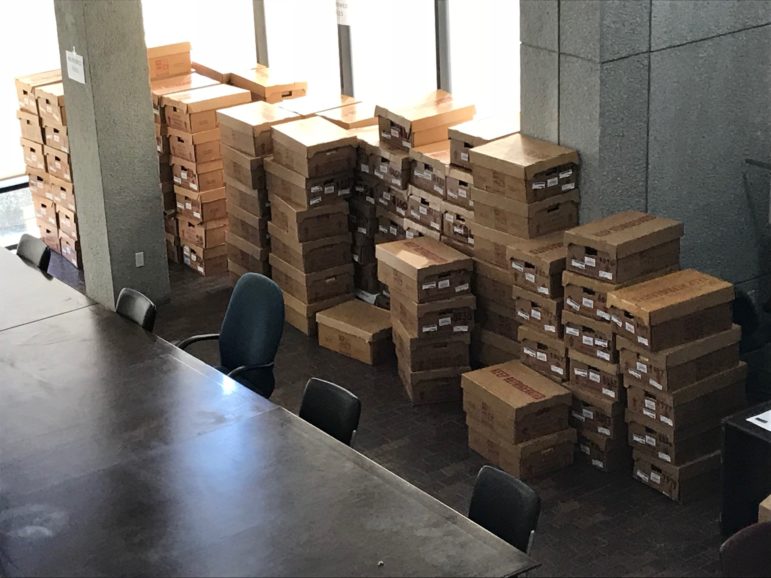
After insisting for months it’s practically impossible to comb through case files to find copies of fake subpoenas issued by his prosecutors, District Attorney Leon Cannizzaro’s staff is now doing just that.
About 100 employees are pitching in to search 100,000 paper files and 50,000 scanned, electronic files, looking for fake subpoenas and material witness warrants sought by the New Orleans City Council, according to the DA’s office.
The DA has been under pressure to provide records on the practices. Last month, Civil District Court Judge Kern Reese gave Cannizzaro 30 days to give The Lens some of the fake subpoenas sent in the past two years.
Cannizzaro spokesman Ken Daley said the office intends to comply with the judge’s order.
The day Reese ruled, the city council sent Cannizzaro a letter with a laundry list of things it wanted to know, including how many cases it accepts for prosecution, its conviction rate, and how many juvenile cases it transfers to adult court.
The city council also demanded to know how many times assistant district attorneys used “DA subpoenas” — which is what the office called the phony subpoenas — and material witness warrants between 2014 to 2016.
The DA’s office uses material witness warrants to arrest victims and witnesses who allegedly refuse to cooperate with prosecutors.
Cannizzaro’s office has been criticized for its use of those warrants, which are legal, and for issuing fake subpoenas, which don’t appear to be.
Tuesday, the DA’s office delivered a box to City Hall with about 4,400 pages that, according to Cannizzaro’s letter, answer most of the council’s questions — but not those about fake subpoenas and material witness warrants.
It will take about six months to compile those records, Cannizzaro said in his letter, in part because he doesn’t want the search to get in the way of employees’ normal duties.
Staff, including assistant district attorneys, investigators and clerical workers, “are being asked to devote additional hours to this project during the week and on weekends,” Daley said in an email.
Boxes of old case files are being delivered from a storage facility, searched, and returned because of limited space in the DA’s office, Daley said.
The Lens first reported on prosecutors’ use of fake subpoenas in April. The documents — which were marked “SUBPOENA” and threatened jail time for failing to comply — were used to pressure witnesses and crime victims to appear at the DA’s office for private meetings with prosecutors.
Under state law, prosecutors can compel witnesses and victims to come in for such meetings, but they first must get approval from a judge. In the cases we found, the DA’s office did not take those steps. The “subpoenas” were a ruse.
Cannizzaro discontinued the practice the same day The Lens published its first story. Since then, the DA’s office has faced three state public records lawsuits and one federal civil rights lawsuit related to the practice.
The use of arrest warrants for witnesses and crime victims, which was highlighted earlier this year by watchdog group Court Watch NOLA, has come under renewed scrutiny in light of the office’s use of fake subpoenas.
In June, The Lens reported on a case in which a prosecutor obtained a warrant for an alleged domestic violence victim in part because she did not obey a fake subpoena. However, prosecutors dropped the charges against the defendant before she could be arrested.
In October, the ACLU and the Civil Rights Corps filed a federal civil rights lawsuit against the DA’s office for jailing witnesses and issuing fake subpoenas. Those groups claim to have found nine additional cases in which prosecutors obtained warrants for victims or witnesses who disobeyed fake subpoenas. In six of those cases, according to the suit, they were jailed.
The Lens filed a public records request in April for fake subpoenas issued between January 2016 and April 2017.
The DA’s office denied our request, saying the only way to find the documents would be to manually search thousands of case files, which was too much work.
The Lens sued, and at an October court hearing, the DA’s office made the same argument.
Assistant District Attorney Donna Andrieu testified that The Lens’ records requests didn’t seek files in a way that matched how the DA’s office keeps them.
The office organizes its files by case, she said. “We don’t have a filing cabinet full of DA subpoenas — or any other document.”
In a press release this week, Cannizzaro’s office said staff members had not found a single fake subpoena in its review of the first 100 boxes of case files. However, in a court hearing this month regarding a different public records lawsuit, Assistant District Attorney Scott Vincent said he wasn’t sure that each fake subpoena had even made it into a case file.
In his ruling for The Lens, Reese said the DA’s office must “eat the elephant one bite at a time.” He said the first batch should be handed over within 30 days, or by the end of November. The written judgment has yet to be finalized and signed.
Reese did not grant The Lens’ request for fake subpoenas issued in cases that remain open, noting that open files at the DA’s office are not subject to public review. The Lens’ lawyer had argued that if prosecutors had used real subpoenas, they would be on file in the court clerk’s office.
